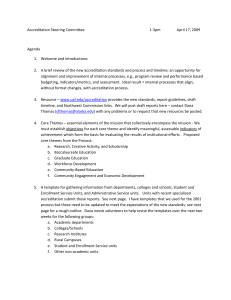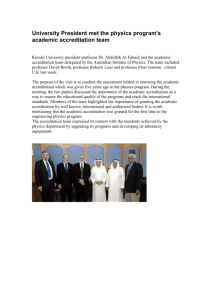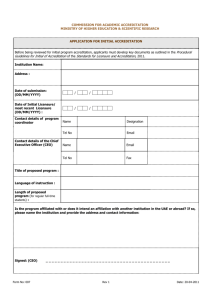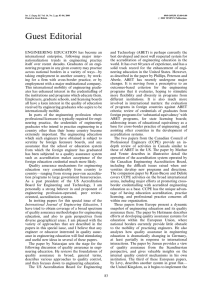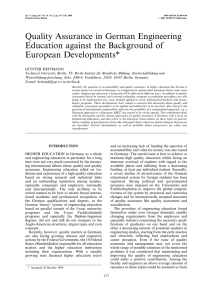Int. J. Engng Ed. Vol. 16, No. 2, p. 81,... 0949-149X/91 $3.00+0.00 Printed in Great Britain. # 2000 TEMPUS Publications.
advertisement
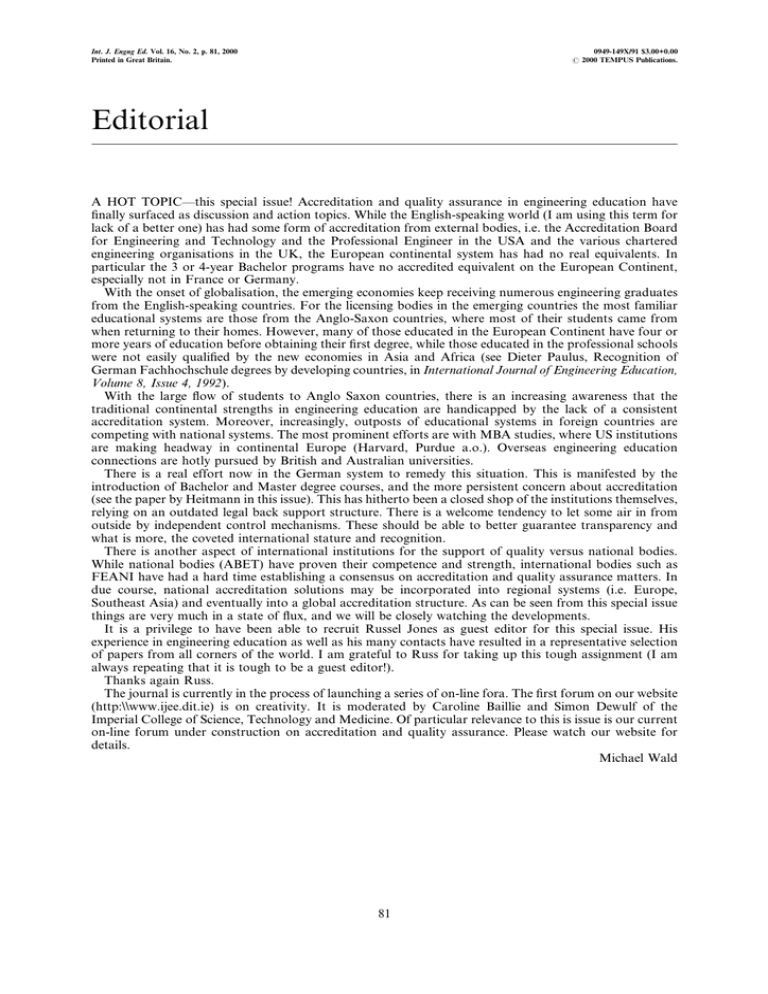
Int. J. Engng Ed. Vol. 16, No. 2, p. 81, 2000 Printed in Great Britain. 0949-149X/91 $3.00+0.00 # 2000 TEMPUS Publications. Editorial A HOT TOPICÐthis special issue! Accreditation and quality assurance in engineering education have ®nally surfaced as discussion and action topics. While the English-speaking world (I am using this term for lack of a better one) has had some form of accreditation from external bodies, i.e. the Accreditation Board for Engineering and Technology and the Professional Engineer in the USA and the various chartered engineering organisations in the UK, the European continental system has had no real equivalents. In particular the 3 or 4-year Bachelor programs have no accredited equivalent on the European Continent, especially not in France or Germany. With the onset of globalisation, the emerging economies keep receiving numerous engineering graduates from the English-speaking countries. For the licensing bodies in the emerging countries the most familiar educational systems are those from the Anglo-Saxon countries, where most of their students came from when returning to their homes. However, many of those educated in the European Continent have four or more years of education before obtaining their ®rst degree, while those educated in the professional schools were not easily quali®ed by the new economies in Asia and Africa (see Dieter Paulus, Recognition of German Fachhochschule degrees by developing countries, in International Journal of Engineering Education, Volume 8, Issue 4, 1992). With the large ¯ow of students to Anglo Saxon countries, there is an increasing awareness that the traditional continental strengths in engineering education are handicapped by the lack of a consistent accreditation system. Moreover, increasingly, outposts of educational systems in foreign countries are competing with national systems. The most prominent efforts are with MBA studies, where US institutions are making headway in continental Europe (Harvard, Purdue a.o.). Overseas engineering education connections are hotly pursued by British and Australian universities. There is a real effort now in the German system to remedy this situation. This is manifested by the introduction of Bachelor and Master degree courses, and the more persistent concern about accreditation (see the paper by Heitmann in this issue). This has hitherto been a closed shop of the institutions themselves, relying on an outdated legal back support structure. There is a welcome tendency to let some air in from outside by independent control mechanisms. These should be able to better guarantee transparency and what is more, the coveted international stature and recognition. There is another aspect of international institutions for the support of quality versus national bodies. While national bodies (ABET) have proven their competence and strength, international bodies such as FEANI have had a hard time establishing a consensus on accreditation and quality assurance matters. In due course, national accreditation solutions may be incorporated into regional systems (i.e. Europe, Southeast Asia) and eventually into a global accreditation structure. As can be seen from this special issue things are very much in a state of ¯ux, and we will be closely watching the developments. It is a privilege to have been able to recruit Russel Jones as guest editor for this special issue. His experience in engineering education as well as his many contacts have resulted in a representative selection of papers from all corners of the world. I am grateful to Russ for taking up this tough assignment (I am always repeating that it is tough to be a guest editor!). Thanks again Russ. The journal is currently in the process of launching a series of on-line fora. The ®rst forum on our website (http:\\www.ijee.dit.ie) is on creativity. It is moderated by Caroline Baillie and Simon Dewulf of the Imperial College of Science, Technology and Medicine. Of particular relevance to this is issue is our current on-line forum under construction on accreditation and quality assurance. Please watch our website for details. Michael Wald 81


